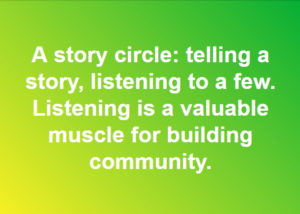Collaboration – getting people to share information and co-create solutions is critical to a healthy community’s success. However, it is not always easy to achieve. Our biases impact how we form first impressions, decide with whom to work, whose ideas we listen to, determine to whom we provide opportunities, and more. Bias can cause us to make an unfair value judgment about people who differ from us. Most people like to think of themselves as ‘good citizens’ who rationally evaluate all the information. Actually, our good-citizen intentions are often tethered to our normally helpful, lazy, hard-wired brains. #InformationLiteracy
The lazy brain naturally creates shortcuts that favor bias. To have a positive impact, how do you inform your judgments and decisions and foster inclusion and collaboration? Sharing stories, active listening and deepening questions are tools for community engagement that can lessen the laziness of our brains. All these tools, or muscles, can be built up by participating in Story Circles with strangers. Story Circles are community events that create safe and facilitated opportunities for self and community discovery most often related to a large project or community theme.
It is more common than not that people, maybe even yourself, feel like you’re the only sane one in a world gone crazy. People resist challenging information, often without realizing it, by applying confirmation bias, accepting information that confirms what is already believed and ignoring everything else. This is easy to do if those interacting agree among themselves. Any kind of basic reasoning can be biased. Information from another perspective is often classified as wrong. There is an inherent fear that a better understanding might change your beliefs. This can be so, but understanding does not necessarily equate to agreeing.
Heuristics, the tools of the lazy brain, are cognitive rules of thumb, hard-wired mental shortcuts that everyone uses every day in routine decision making and judgment. Heuristics are normally helpful – indeed, they are crucial to getting through the myriad of decisions we face every day without overthinking every choice. But they’re imperfect and often irrational. They can be traps, even perilous. The shortcuts that allow us to navigate each day with ease are the same ones that can potentially trip us up in our ordinary judgments and choices, in everything from health, to finance, to romance, to behaving with an awareness of others.
Some believe that Story Circles are an enjoyable way to give your lazy brain a vacation from bias and help you realize the humanness that we all share.
